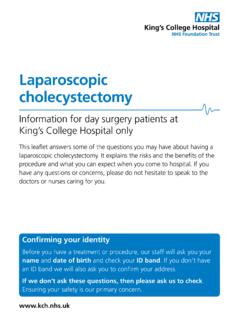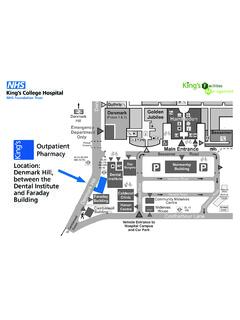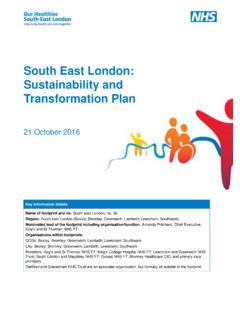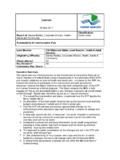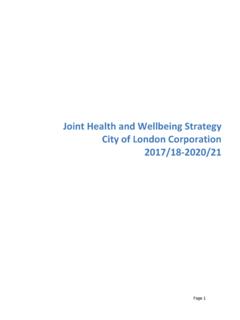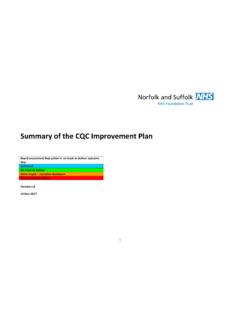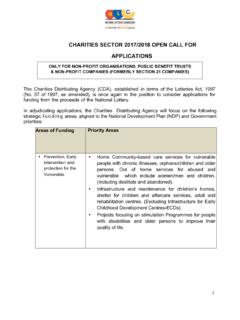Transcription of King’s College Hospital NHS Foundation Trust Board of ...
1 1 King s College Hospital NHS Foundation Trust Board of Directors - PUBLIC Minutes of the meeting of the Board of Directors held at 09:30 on Tuesday, 02 February 2016 in the Dulwich Room, Hambledon Wing, King's College Hospital , Denmark Hill site Members: Lord Kerslake (BK) Trust Chair Sue Slipman (SS) Non-Executive Director, Vice Chair Chris Stooke (CS) Non-Executive Director Faith Boardman (FB) Non-Executive Director (part) Prof. Ghulam Mufti (GM1) Non-Executive Director Prof. Jon Cohen Non-Executive Director Dr Alix Pryde (AP) Non-Executive Director Erik Nordkamp (EN) Non-Executive Director Nick Moberly (NM) Acting Chief Executive Officer Dawn Brodrick (DB) Director of Workforce Development Alan Goldsman (AG) Non-voting Director Interim Chief Financial Officer Ahmad Toumadj (AT) Non-voting Director Interim Director of Capital, Estates & Facilities Jeremy Tozer (JT) Interim Chief Operating Officer Geraldine Walters (GW) Director of Nursing & Midwifery In attendance.
2 Tamara Cowan (TC) Board Secretary (Minutes) Paul Donohoe (PD) Assistant Medical Director Anne Duffy (AD) Divisional Head of Nursing, Lead Cancer Nurse Jessica Bush (JB) Head of Patient Involvement & Volunteering Fiona Clark (FC) Public Governor Tim Bradley Public Governor Jan Thomas Patient Governor Andy Simmons Southwark Council Homa Arshad Consultant Applicant, KCH Apologies: Julia Wendon (JW prior to Feb 2016 ref JW1) Medical Director Sally Lingard (SL) Associate Director of Communications Judith Seddon (JS) Non-voting Director Acting Director of Corporate Affairs Trudi Kemp (TK) Non-voting Director Director of Strategic Development Steve Leivers (SL1) Non-voting Director Director of transformation & Turnaround Item Subject Action 16/1 Apologies Apologies for absence were noted.
3 The Chair also welcomed EN and CG to their first meeting of the Board of Directors. 16/2 Declarations of Interest There were no declarations of interest reported. 2 Item Subject Action 16/3 Chair s Action There were no Chair s actions to report. 16/4 Minutes of Previous Meeting The minutes of the meeting held on 15 December 2015 was approved as a correct record. 16/5 Matters Arising/Action Tracking The action tracker was noted and there were no matters arising since the last meeting raised for discussion. 16/6 Patient Story Anne Duffy presented to the Board the story of a patient using the Chartwell Unit. The Chartwell Unit provides local cancer service to the people of Bromley and the surrounding area. Patients undergo assessment, diagnosis and possible treatment for cancer including malignant and non-malignant haemato-oncology patients, oncology patients and palliative care patients.
4 The following key points were highlighted from the patient s story: The Trust is not very good a looking at patient s lifestyle when choosing a course of action; Lack of effective leadership was a big issue in addition to staff not engaging with patients who have long-term care sessions. There has been a review of the leadership, which is being addressed, and operational changes implemented and subject to annual review with nurses. The patient environment needed significant improvement which has now been completed; and There needed to breast service nurses available at the beginning and end of the day which is now in place. The Board raised the following key points in discussion: The story is valuable and it is evident that this particular patient is well informed coming from a nursing background.
5 However most patients do not know the interplay between chemist and GPS is not good therefore the Trust needs to close the gap for the lay patient; As part of the work to improve the operational function in the Unit the Trust consulted with lay patients and accordingly has standardised conversation with patients; Other means of feedback have also been used to drive conversations with patients and the Trust is looking into developing a booklet to support key conversations with patients; 3 Item Subject Action Introductions to peer groups are also valuable and can provide additional support to patients. The Trust does have a Breast Support Group at the Princess Royal University Hospital (PRUH) site; Core is communication. There is lots of fascinating research on how communication is key in any patient care pathway.
6 Accordingly the Trust has to look at this case and work with nurses colleagues to improve patient experience; Whilst the Trust uses all patient stories in nurse training it is evident that more could be done to improve engagement with patients and work is underway to develop simulation training using mind and body methodologies; There had previously been discussions about expanding the capacity to host mental health patients with SLaM but these did not reach fruition; Through competency performance management and verbal redress the Trust is dealing with insistent professionals ; The connection with employees and patients should be used as engagement and discussion tools to make changes necessary; The Trust is also using value based standards, results from national cancer surveys and local resources such as how are we doing results, divisional scorecards to support targeted training; The patient story is very powerful and it is positive that the Trust made some valuable changes to the system and design of the service.
7 As part of the emerging strategic vision, which implies brilliant outcomes, this is at the heart of how the Trust transform its services namely through listening to patients feedback taking a systemic approach to changing services whilst holding people to account; Oncologist come from the Cancer Centre therefore patients in the Chartwell Unit sees the same consultants through their pathway; and It is evident that there is a strong interdependency on open two-way communication and the leadership has to be at the front and centre of applying this model. 16/7 Chief Executive's Report The Board received and noted the report from the chief executive officer (CEO). The following key points were reported: It is time to start the dialogue with the organisation about positive and optimistic view of the organisation; 4 Item Subject Action The financial issues last year dented the confidence to the organisation so it is time to communicate that the Trust is getting to grips on the finances and operations despite there being lots more to do.
8 The Trust is moving towards the future by undertaking a consistent evidence based transformation programme to improve processes and embed best practice. The next steps also including getting the Trust to long-term sustainability and ensuring services are delivered in a sensible ways to support high quality and utilising the KHP dimension; The Trust is on a journey to sustainable excellence through renewal of the Denmark Hill site and it is time to promote this in a vigorous way; and These messages have to be sent out to the organisation to promote confidence that the tanker is turning and the longer-term vision is about sustainability . In discussion the Board raised the following key points: It is acknowledged that people feel stretched and in some cases it is hard to see beyond the here and now; The key challenge lay with institutionalising close financial control rather that the current project approach.
9 It is time to make strong financial controls apart of the culture of the Trust ; The Trust is required to submit an operational plan to Monitor and as part of the new sustainability and transformation plans (STP) the Trust will work with its South East London (SEL) partners to develop a long-range sectorial plan that speaks to genuine sustainability across the sector. The plan will support the NHS moving to a more integrated organisational approach. Our Healthier South East London (OHSEL) will lead the development of the plan and will be the vehicle to generate the transformation plan , which the Trust will have to play a key role; It is good to see that the system is finally moving to a sectorial approach to developing sustainable plans. There is only so much, which is in the control of the Trust , and it relies on others delivering their part in order to succeed in its plan .
10 It would also be useful to understand what role NHS England (NHSE) will play in ensuring all parties achieve their deliverables; This year the Trust has received very good local commissioner support and work continues on those relationships; NHSE is developing a new dashboard to look at performance across the sector. This approach is new to commissioners who are not used to this level of system performance management; 5 Item Subject Action The Better Care Fund (BCF) is still available and separate from the Sustainable and transformation Fund. NHS processes are not very cohesive at present and there are clear tensions between a high cost system and low experience base. The Trust must see how it can get access to the BCF and other means of securing other funding. Development of sectorial plans is a clear way for healthcare organisations to take control of their own destinies; It is not so much about what NHSE can do for the Trust it is about what the local partners can do for themselves and how they hold each other to account; and Given that has been pledged to the acute sector and in SEL there are 6 clinical commissioning groups (CCG) the Trust must be part of the sector leadership.


